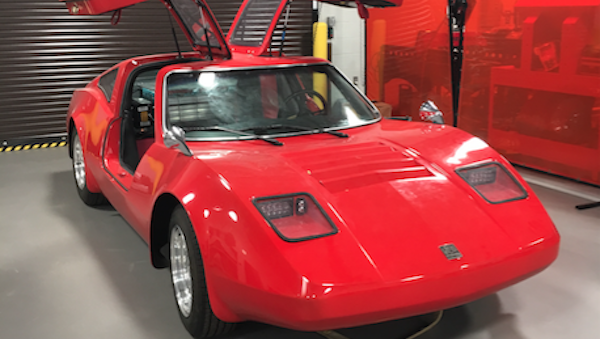School’s only been in for a couple of weeks, but at Thompson High School in Alabaster, engineering students have already begun work on their first assignment: Build a solar powered generator for refugees in Kenya. It’s one of several innovations the students have devised to help poverty-stricken schools across the globe. Their teacher, Brian Copes, has won numerous awards for the impact he has on students both here and abroad.
that electrical charge will turn the salt water into a chlorine bleach
Copes’ classroom feels like a cross between the set of “Back to The Future” and a mad man’s workshop. There are half-built cars, an assortment of large industrial-looking batteries, and tons and tons of tools scattered around the shop. On the first day back to class, about a dozen students gather in the shop as Copes explains their assignment:
“We hook it up to a car battery and basically that electrical charge will turn the salt water into a chlorine bleach,” Copes says.
He wants them to build a water chlorinator to provide clean water to developing nations. Some of the class’s recent designs are being put to use more than a thousand miles away.
Summer Honeycutt, a senior at Thompson, worked on last year’s project: a portable classrooms and computer labs for a sister school in Central America.
“I worked on a container classroom,” she says. “[We] made a welding container out of a 40-foot [shipping] container, and that’s actually in Honduras right now.”
Copes and his students have traveled to schools in Honduras several times to install some of the technology they’ve developed. They’ve built utility vehicles made out of pipe and prosthetic legs assembled from car parts. But years ago he never envisioned himself teaching engineering. He was a carpenter.
“I don’t have that engineering background,” Copes says. “It’s just, over the years I thought I was going to teach woodshop, but my title just kept changing and evolving to ‘ok, I’m an engineering teacher now.”
Copes has since won numerous accolades for his teaching. And that’s not surprising to Koen Timmers, a teacher from Belgium and fellow competitor for the 2018 Global Teacher Prize.
Copes and Timmers met at a conference in Dubai. Timmers had a problem: students in refugee camps in Kenya took classes over Skype. But the diesel generators that powered the computers at the camp were unreliable and expensive. So Timmers asked Copes and his students to develop a solar power generator that was cheap and portable.
“And he told me consider it done,” Timmers says. “A few months later Brian sent me a picture of the solar suitcase and they even designed a logo. I was amazed.”
Timmers says he admires Copes’ creativity and his willingness to take action. And for Copes, these service learning projects are a lesson on the impact students can make in the world.
“When the opportunity comes up are you going to be scared to make that step or are you going to make an excuse,” Copes asks. “Or are you going to say it’s what I’m here for and go out and make a difference in the world while I can?”
And Copes says if that’s one lesson his students take home, that’s the ultimate prize.

